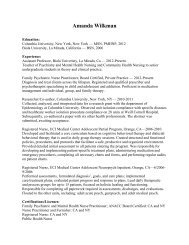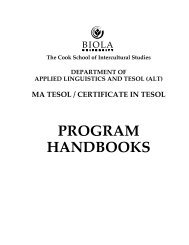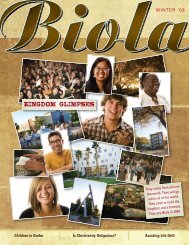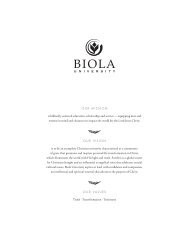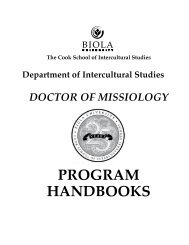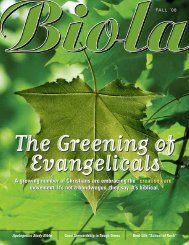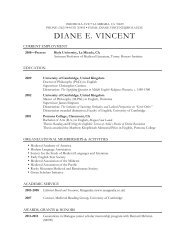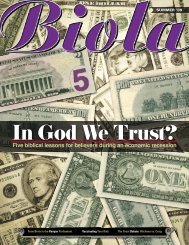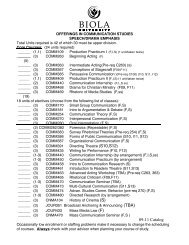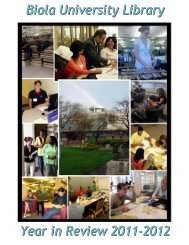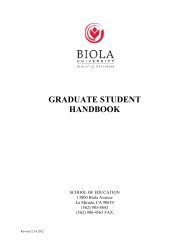Dawkins' God Delusion Divorced American ... - Biola University
Dawkins' God Delusion Divorced American ... - Biola University
Dawkins' God Delusion Divorced American ... - Biola University
You also want an ePaper? Increase the reach of your titles
YUMPU automatically turns print PDFs into web optimized ePapers that Google loves.
28 MISC.<br />
BIOLA CONNECTIONS ❄ SPRING ’07<br />
Renewed Skepticism<br />
Princeton religion professor Elaine Pagels, author of The Gnostic Gospels and Beyond<br />
Belief, was among those honored at the “Scripture and Skepticism” conference held<br />
in January at the <strong>University</strong> of California, Davis.<br />
Just prior to the 2004 presidential<br />
election, I was walking with my wife<br />
through a popular mall in Orange<br />
County when I noticed something<br />
strange about the music that was playing. It<br />
sounded like any other pop song, only the lyrics<br />
were clearly about repentance and forgiveness.<br />
The song, it turned out, was “Between You and<br />
Me” by the band “DC Talk” (which stands for<br />
“Decent Christian Talk”).<br />
The song was just one of many popular<br />
tunes being played by a cable music provider.<br />
Yet I couldn’t help but be struck by the mainstream<br />
acceptance it seemed to have. Meanwhile,<br />
Mel Gibson’s The Passion of the Christ was<br />
playing in the mall’s movie theater and was fast<br />
becoming one of the biggest blockbusters in<br />
movie history, eventually grossing more than<br />
$370 million in domestic receipts.<br />
After the presidential election, my<br />
mouth dropped as I watched reporters on The<br />
News Hour With Jim Lehrer seek advice from<br />
megachurch pastor Rick Warren on how<br />
Democrats could better connect with evangelical<br />
voters. Warren’s book, The Purpose Driven Life,<br />
was the fourth highest-selling book in 2004.<br />
By all accounts, evangelicals had become<br />
the culture’s new power brokers, being credited<br />
with determining elections, box-office hits and<br />
No. 1 best sellers. In 2005, Time Magazine featured<br />
a cover story entitled “The 25 Most<br />
Influential Evangelicals,” in an attempt to identify<br />
who was leading this wave of cultural and<br />
political influence. In 2006, evangelicals continued<br />
to make headlines, often appearing at<br />
center stage in debates on traditional marriage,<br />
immigration and the war in Iraq.<br />
The sudden rise of evangelicalism took<br />
many by surprise, especially liberal scholars and<br />
atheists who were now being asked, for the first<br />
time, to be more tolerant of religious views.<br />
After the 2004 election, the Society for Values in<br />
Higher Education began writing what is now<br />
called “The Wingspread Declaration on Religion<br />
and Public Life: Engaging Higher Education,”<br />
which calls for, among other things, increased<br />
Judith Calson / San Jose Mercury News<br />
religious literacy in students’ education, civility<br />
in religious discussions and helping students<br />
connect their spiritual development with their<br />
intellectual growth.<br />
This mainstreaming of religious tolerance<br />
has led to renewed efforts to undermine the<br />
validity of Christianity as an acceptable worldview.<br />
One such effort is the “Scripture and<br />
Skepticism” conference held at the <strong>University</strong><br />
of California, Davis, on Jan. 25-28. The conference,<br />
sponsored by The Committee for the<br />
Scientific Examination of Religion (CSER),<br />
aimed to use the historical-critical method to<br />
challenge the historicity of both biblical and<br />
koranic texts, and attempted to lump evangelicalism<br />
together with radical Islam.<br />
During the conference, CSER announced<br />
the launch of “The Jesus Project” — not to be<br />
confused with its cousin, “The Jesus Seminar” —<br />
to examine the evidence for the historical Jesus,<br />
using skepticism as a way of demythologizing the<br />
gospel accounts. CSER plans to release its findings<br />
to universities, colleges and seminaries<br />
beginning in March 2007 in hopes of taking<br />
back some of the turf lost to evangelicals in<br />
recent years.<br />
The renewed skepticism brewing in academia<br />
— including books like Dawkins’ <strong>God</strong><br />
<strong>Delusion</strong> (see page 7) — will be among the many<br />
challenges facing <strong>Biola</strong> <strong>University</strong> as it enters its<br />
second century of educating students to impact<br />
the world for Jesus Christ. But its faculty of<br />
engaging scholars, who led the evangelical<br />
response to “The Jesus Seminar” with the publication<br />
of Jesus Under Fire (Zondervan, 1996), has<br />
never been more ready for the challenge. Since<br />
the publication of that book, <strong>Biola</strong> has added 65<br />
full-time faculty to its academic community<br />
from a variety of disciplines. With all the energy<br />
and scholarship taking place on campus, and<br />
with theological skepticism on the rise, the<br />
coming years are sure to be invigorating.<br />
Rob Westervelt<br />
(M.A.’97), Editor



